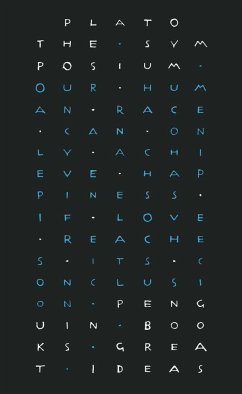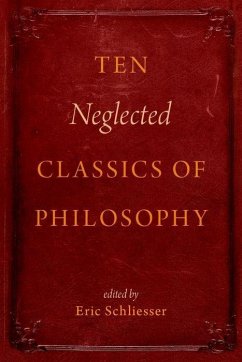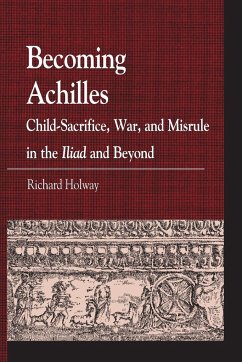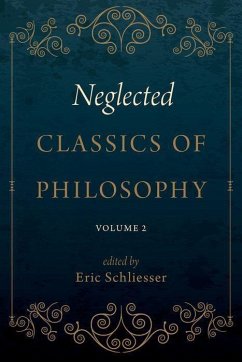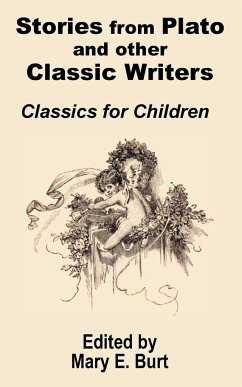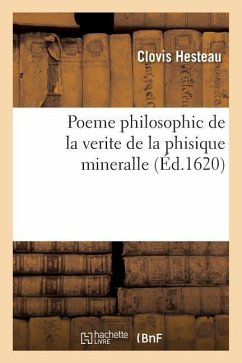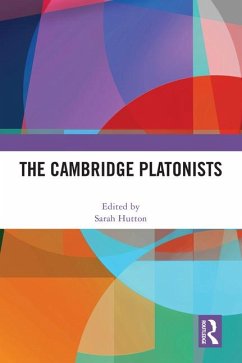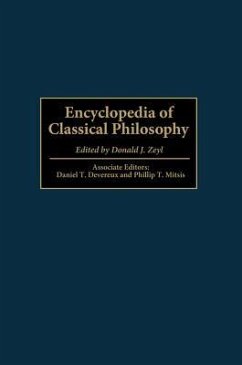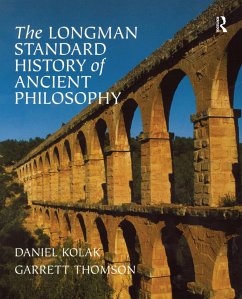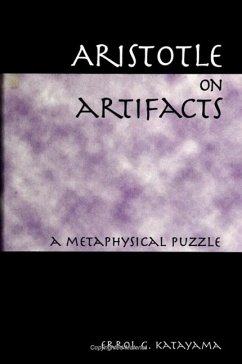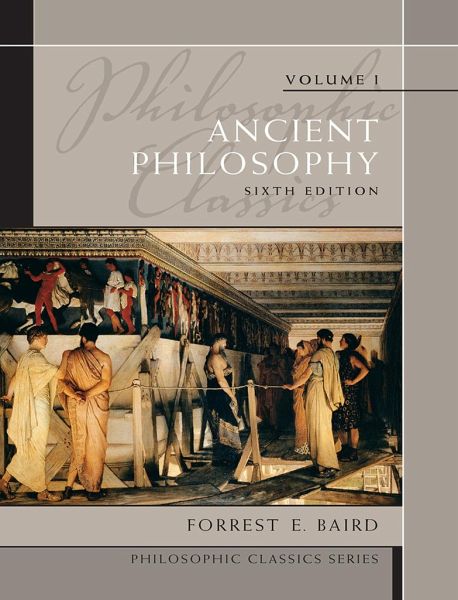
Philosophic Classics
Ancient Philosophy, Volume I
Versandkostenfrei!
Versandfertig in über 4 Wochen
168,99 €
inkl. MwSt.

PAYBACK Punkte
84 °P sammeln!
For courses in Ancient Philosophy, Ancient Greek and Roman Philosophy, and as a supplement for History of the Ancient World.
Esteemed for providing the best available translations, Philosophic Classics: Ancient Philosophy, features complete works or complete sections of the most important works by the major thinkers, as well as shorter samples from transitional thinkers.
First published in 1961, Forrest E. Baird's revision of Philosophic Classics, Pearson Education's long-standing anthology (available in split volumes), continues the tradition of providing generations of students with high quality course material. Using the complete works, or where appropriate, complete sections of works, this anthology allows philosophers to speak directly to students.
In addition, the pluthora of material within the main anthology, or each period volume, allows professors to tailor the readings to their classroom needs. For, those who either use this text in a traditional semester long course, or those that offer the course year after year, will find that it offers an opportunity to "change the menu" as often as needed - without having to assign multiple books!
For more information on the main combined anthology, or the additional period volumes, please see below:
Philosophic Classics: From Plato to Derrida, 6/E ISBN-10: 0205783864
Philosophic Classics, Volume II: Medieval and Renaissance Philosophy, 6/E ISBN-10: 0205783902
Philosophic Classics, Volume III: Modern Philosophy, 6/E ISBN-10: 0205783899
Product Description
Esteemed for providing the best available translations, Philosophic Classics: Ancient Philosophy, features complete works or complete sections of the most important works by the major thinkers, as well as shorter samples from transitional thinkers.
First published in 1961, Forrest E. Baird's revision of Philosophic Classics, Pearson Education's long-standing anthology (available in split volumes), continues the tradition of providing generations of students with high quality course material. Using the complete works, or where appropriate, complete sections of works, this anthology allows philosophers to speak directly to students.
For more information on the main combined anthology, or the additional period volumes, please see below:
Philosophic Classics: From Plato to Derrida, 6/E ISBN-10: 0205783864
Philosophic Classics, Volume II: Medieval and Renaissance Philosophy, 6/E ISBN-10: 0205783902
Philosophic Classics, Volume III: Modern Philosophy, 6/E ISBN-10: 0205783899
Features + Benefits
Key Features of Philosophic Classics, Volume 1: Ancient Philosophy:
The best available translations.
Provides students with selections that are readable and accessible, while still being faithful to the original works.
Complete works or complete sections of works.
Immerses students in the complexity and dynamics of philosophical dialogue, encouraging them to follow the careful interweaving of thought and reason and to think critically themselves about the topics-something that simple summaries of doctrine simply cannot do.
An abundance of selections-More than can easily fit into a normal semester.
Offers instructors an opportunity to "change the menu as often as they would like.
Shows the development of ideas.
Gives students a sense of the development of ideas by stressing the connections between thinkers.
Introductions to each period and thinker.
Helps students put philosophical inquiry into context, showing how philosophers and schools of thought were affected by the events that surrounded them, and how they, in turn, may have influenced others.
Three-part introductions to each thinker-Biographical (a glimpse of the life of the philosopher); Philosophical (a résumé of each thinker); and Bibliographical (suggestions for further reading).
Helps students relate the thinkers as people rather than icons; allows students to see how each thinker developed their specific doctrines; and enables students to delve more deeply into the thinkers' lives and thoughts, if desired.
Illustrations and a timeline.
Helps keep students focused on the context and reality of philosophical inquiry.
"Technical" editing for greater readability-Omits most footnotes treating textual matters (variant readings, etc.); standardization of foreign terms and transliteration of necessary Greek terms.
Lets students concentrate on the meaning of the selections without being overwhelmed by technicalities.
Bibliographies.
Appropriate for beginning level students and highlight the most important secondary works and also give guidance to finding alternative interpretations.
The most important works of Euro-American or "Western" Philosophy are covered.
Major works-Features texts which are both central to each thinker and are widely accepted to be part of the canon.
Introduces students to the most influential and widely read texts.
Where appropriate, women writers are included and the role of women in the primarily male-dominated history of Western philosophy is noted.
New selections in bold.
BEFORE SOCRATES
The Milesians.
ThalesAnaximanderAnaximenes
Three Solitary Figures
PythagorasXenophanesHeraclitus
The Monists
ParmenidesZeno of Elea
The Pluralists.
EmpedoclesAnaxagorasDemocritus (and Leucippus)
Three Sophists.
ProtagorasGorgiasCritias
Epilogue I: Two Views of AthensThucydides
Pericles Funeral Oration The Melian Conference
Epilogue II: Aspasia PLATO
EuthyphroApologyCritoPhaedoMenoSymposium (189c-193d; 201d-end (223d))Republic (Book I, 336b-349b; 350d-354b; Book II, 357a-362c; 367e-376e; Book III, 386b-d; 387b-388e; 412b-417b; Book IV, 427d-445e; Book V, complete: 449-480a; Book VI-VII, 502c-521b Book VIII 562a-563-e)Parmenides (127-135)Theaetetus (selections) PLEASE NOTE THIS SECTION MAY BE CUT DUE TO PAGE COUNT, PLEASE CHECK AFTER BOOK HAS PUBLISHED AND CORRECT ACCORDINGLYTimaeus (27d-34b)Laws (selections)
ARISTOTLE
Categories (Chapters 1-5)On Interpretation (Chapters 1-9)Posterior Analytics (Book I, 1-2; Book II, 19)Physics (Book II complete)Metaphysics (Books I and XII complete)On the Soul (Book II, 1-3; Book III, 4-5)Nichomachean Ethics (Book I-II; Book III, 1-5; Book IV, 3; Books VI-VII; Book X,6-8, 9)Politics (Book I, 1-2; Book III, 6-9; Book IV, 11-12; Book VII, 3b-4, 9)Poestics (Chapter 6)
HELLENISTIC AND ROMAN PHILOSOPHY
Epicurus.
Letter to HerodotusLetter to MenoeceusPrincipal Doctrines
Lucretius.
On the Nature of Universe (Book II, 216-284; Book III, tselections through 831)
The Early Stoa: Zeno of Citium and Cleanthes
Zeno of Citium (selections from Diogenes Laertius) Cleanthes, Hymn to Zeus
Epictetus
Handbook (Encheiridion )
Marcus Aurelius
Meditations (Book IV)
Pyrrho and Sextus Empiricus
Outlines of Pyrrhonism (Book I, 1-15) THIS MAY CHANGE TO 1-13 DEPENDING ON PAGE COUNT PLEASE CHECK UPON PUBLICATION
Plotinus
Enneads (I, Tractate 6; V, Tractate 1, 1-12; V, Tractate 3, 12,9-end)-THE BOLDED SECTION MAY BE DELETED DEPENDING ON FINAL PAGE COUNT
Esteemed for providing the best available translations, Philosophic Classics: Ancient Philosophy, features complete works or complete sections of the most important works by the major thinkers, as well as shorter samples from transitional thinkers.
First published in 1961, Forrest E. Baird's revision of Philosophic Classics, Pearson Education's long-standing anthology (available in split volumes), continues the tradition of providing generations of students with high quality course material. Using the complete works, or where appropriate, complete sections of works, this anthology allows philosophers to speak directly to students.
In addition, the pluthora of material within the main anthology, or each period volume, allows professors to tailor the readings to their classroom needs. For, those who either use this text in a traditional semester long course, or those that offer the course year after year, will find that it offers an opportunity to "change the menu" as often as needed - without having to assign multiple books!
For more information on the main combined anthology, or the additional period volumes, please see below:
Philosophic Classics: From Plato to Derrida, 6/E ISBN-10: 0205783864
Philosophic Classics, Volume II: Medieval and Renaissance Philosophy, 6/E ISBN-10: 0205783902
Philosophic Classics, Volume III: Modern Philosophy, 6/E ISBN-10: 0205783899
Product Description
Esteemed for providing the best available translations, Philosophic Classics: Ancient Philosophy, features complete works or complete sections of the most important works by the major thinkers, as well as shorter samples from transitional thinkers.
First published in 1961, Forrest E. Baird's revision of Philosophic Classics, Pearson Education's long-standing anthology (available in split volumes), continues the tradition of providing generations of students with high quality course material. Using the complete works, or where appropriate, complete sections of works, this anthology allows philosophers to speak directly to students.
For more information on the main combined anthology, or the additional period volumes, please see below:
Philosophic Classics: From Plato to Derrida, 6/E ISBN-10: 0205783864
Philosophic Classics, Volume II: Medieval and Renaissance Philosophy, 6/E ISBN-10: 0205783902
Philosophic Classics, Volume III: Modern Philosophy, 6/E ISBN-10: 0205783899
Features + Benefits
Key Features of Philosophic Classics, Volume 1: Ancient Philosophy:
The best available translations.
Provides students with selections that are readable and accessible, while still being faithful to the original works.
Complete works or complete sections of works.
Immerses students in the complexity and dynamics of philosophical dialogue, encouraging them to follow the careful interweaving of thought and reason and to think critically themselves about the topics-something that simple summaries of doctrine simply cannot do.
An abundance of selections-More than can easily fit into a normal semester.
Offers instructors an opportunity to "change the menu as often as they would like.
Shows the development of ideas.
Gives students a sense of the development of ideas by stressing the connections between thinkers.
Introductions to each period and thinker.
Helps students put philosophical inquiry into context, showing how philosophers and schools of thought were affected by the events that surrounded them, and how they, in turn, may have influenced others.
Three-part introductions to each thinker-Biographical (a glimpse of the life of the philosopher); Philosophical (a résumé of each thinker); and Bibliographical (suggestions for further reading).
Helps students relate the thinkers as people rather than icons; allows students to see how each thinker developed their specific doctrines; and enables students to delve more deeply into the thinkers' lives and thoughts, if desired.
Illustrations and a timeline.
Helps keep students focused on the context and reality of philosophical inquiry.
"Technical" editing for greater readability-Omits most footnotes treating textual matters (variant readings, etc.); standardization of foreign terms and transliteration of necessary Greek terms.
Lets students concentrate on the meaning of the selections without being overwhelmed by technicalities.
Bibliographies.
Appropriate for beginning level students and highlight the most important secondary works and also give guidance to finding alternative interpretations.
The most important works of Euro-American or "Western" Philosophy are covered.
Major works-Features texts which are both central to each thinker and are widely accepted to be part of the canon.
Introduces students to the most influential and widely read texts.
Where appropriate, women writers are included and the role of women in the primarily male-dominated history of Western philosophy is noted.
New selections in bold.
BEFORE SOCRATES
The Milesians.
ThalesAnaximanderAnaximenes
Three Solitary Figures
PythagorasXenophanesHeraclitus
The Monists
ParmenidesZeno of Elea
The Pluralists.
EmpedoclesAnaxagorasDemocritus (and Leucippus)
Three Sophists.
ProtagorasGorgiasCritias
Epilogue I: Two Views of AthensThucydides
Pericles Funeral Oration The Melian Conference
Epilogue II: Aspasia PLATO
EuthyphroApologyCritoPhaedoMenoSymposium (189c-193d; 201d-end (223d))Republic (Book I, 336b-349b; 350d-354b; Book II, 357a-362c; 367e-376e; Book III, 386b-d; 387b-388e; 412b-417b; Book IV, 427d-445e; Book V, complete: 449-480a; Book VI-VII, 502c-521b Book VIII 562a-563-e)Parmenides (127-135)Theaetetus (selections) PLEASE NOTE THIS SECTION MAY BE CUT DUE TO PAGE COUNT, PLEASE CHECK AFTER BOOK HAS PUBLISHED AND CORRECT ACCORDINGLYTimaeus (27d-34b)Laws (selections)
ARISTOTLE
Categories (Chapters 1-5)On Interpretation (Chapters 1-9)Posterior Analytics (Book I, 1-2; Book II, 19)Physics (Book II complete)Metaphysics (Books I and XII complete)On the Soul (Book II, 1-3; Book III, 4-5)Nichomachean Ethics (Book I-II; Book III, 1-5; Book IV, 3; Books VI-VII; Book X,6-8, 9)Politics (Book I, 1-2; Book III, 6-9; Book IV, 11-12; Book VII, 3b-4, 9)Poestics (Chapter 6)
HELLENISTIC AND ROMAN PHILOSOPHY
Epicurus.
Letter to HerodotusLetter to MenoeceusPrincipal Doctrines
Lucretius.
On the Nature of Universe (Book II, 216-284; Book III, tselections through 831)
The Early Stoa: Zeno of Citium and Cleanthes
Zeno of Citium (selections from Diogenes Laertius) Cleanthes, Hymn to Zeus
Epictetus
Handbook (Encheiridion )
Marcus Aurelius
Meditations (Book IV)
Pyrrho and Sextus Empiricus
Outlines of Pyrrhonism (Book I, 1-15) THIS MAY CHANGE TO 1-13 DEPENDING ON PAGE COUNT PLEASE CHECK UPON PUBLICATION
Plotinus
Enneads (I, Tractate 6; V, Tractate 1, 1-12; V, Tractate 3, 12,9-end)-THE BOLDED SECTION MAY BE DELETED DEPENDING ON FINAL PAGE COUNT
First published in 1961, Forrest E. Baird's revision of Philosophic Classics continues the tradition of providing generations of students with high quality course material. Using the complete works, or where appropriate, complete sections of works, this anthology allows philosophers to speak directly to students. Esteemed for providing the best available translations, Philosophic Classics: Ancient Philosophy, features complete works or complete sections of the most important works by the major thinkers, as well as shorter samples from transitional thinkers.



